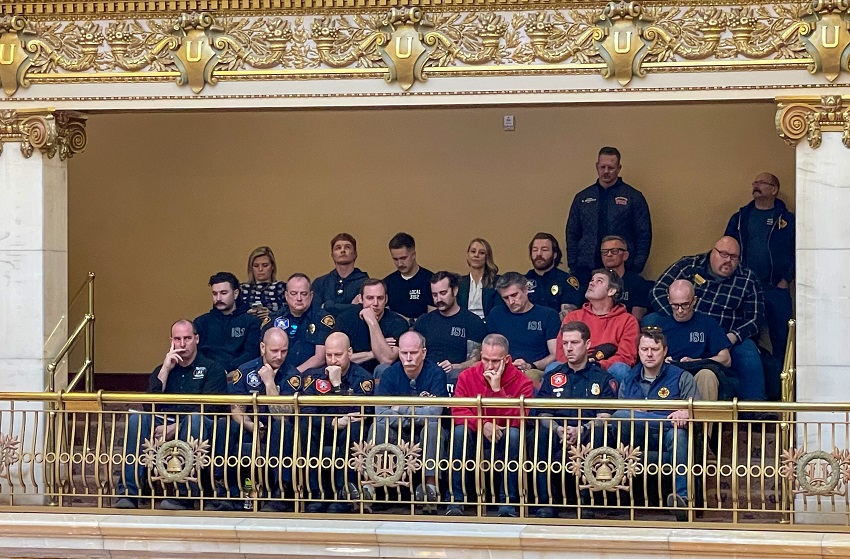Ogden, UT — In a narrow vote Thursday, the Utah Senate passed a controversial bill that would prohibit public labor unions from engaging in collective bargaining. House Bill 267, known as the “Public Sector Labor Union Amendments,” passed with 16 votes in favor and 13 votes against, meeting the required 15-vote threshold to move forward in the legislative process. The bill will now return to the House for further approval before reaching Governor Spencer Cox’s desk for final consideration.
The bill has become a focal point of intense debate and public rallies throughout the legislative session. Supporters of the bill argue that it will bring fiscal responsibility, ensure fair representation for all public employees, and protect taxpayers’ interests. Opponents, however, contend that the bill is harmful to the rights of public-sector workers and undermines the ability of unions to negotiate for fair wages and benefits.
Under the current version of the bill, public sector unions would be barred from entering into new collective bargaining agreements or modifying existing contracts once they expire. Existing agreements would remain in place until their termination. While the bill initially included a proposed compromise that would allow unions to negotiate if a majority of employees voted in favor, this provision was eventually rescinded, and the Senate voted on the original bill, which bans collective bargaining outright.
The passage of H.B. 267 came after several days of public feedback and debate. While all Democratic senators voted against the bill, a small group of Republican senators—Ann Millner, Daniel Thatcher, Wayne Harper, Lincoln Fillmore, Ronald Winterton, David Hinkins, and Evan Vickers—joined in opposition. The remaining 16 Republican senators voted in favor of the bill.
The Utah Education Association (UEA), a prominent public-sector union representing educators, expressed deep disappointment following the vote. In a statement, the UEA condemned the bill as “highly unpopular and unnecessary,” arguing that it undermines the rights of teachers and other public employees in Utah.
“Despite hearing from thousands of public-sector workers and supporters, the majority of Utah lawmakers chose to pass this legislation,” the statement read. “We strongly urge Governor Cox to veto this harmful legislation. This is his opportunity to prove his support for educators and public workers.”
Supporters of the bill, including its sponsor, Senator Kirk Cullimore, argue that it is a necessary reform to address perceived inequities in the current system. Cullimore, speaking in favor of the bill, emphasized that not all public employees are represented by unions and that taxpayers should not be burdened by the influence of unions in the bargaining process.
“This is about fairness for all employees, both union and non-union, and ensuring that taxpayer dollars are being spent wisely,” Cullimore stated.
Americans for Prosperity-Utah, an advocacy group that supported the bill, also praised its passage, claiming that public sector unions have long exerted too much influence in state governance. The group argued that the bill would ensure that Utah’s public funds are being used for the benefit of all citizens, not just union members.
“Public sector unions have fought against school choice reforms that a majority of Utah taxpayers support,” said Kevin Greene, director of Americans for Prosperity-Utah. “This commonsense reform will ensure that taxpayer dollars serve the needs of the public, not unaccountable unions.”
Opponents of the bill, however, have expressed concerns that it will have a detrimental impact on public workers, especially those in frontline positions, such as teachers, police officers, and firefighters. Salt Lake City Mayor Erin Mendenhall issued a statement urging Governor Cox to veto the bill, warning that it would strip public employees of their ability to organize and advocate for their needs.
“This bill will hurt the frontline public servants who Utahns depend on every single day,” Mendenhall said. “While this bill strips away the freedoms of our public employees to form unions and advocate for their collective needs, it will not strip away my commitment to treating our workers fairly.”
With the Senate’s approval, H.B. 267 now moves to the House for further action. If passed by the House, it will be sent to Governor Cox, who will ultimately decide whether to sign the bill into law or veto it. The outcome of this legislation is expected to have significant implications for the future of public labor unions in Utah and could serve as a model for other states considering similar reforms.

